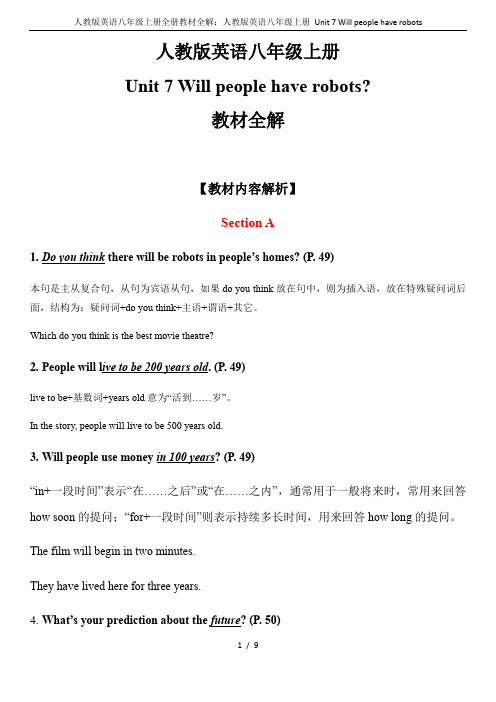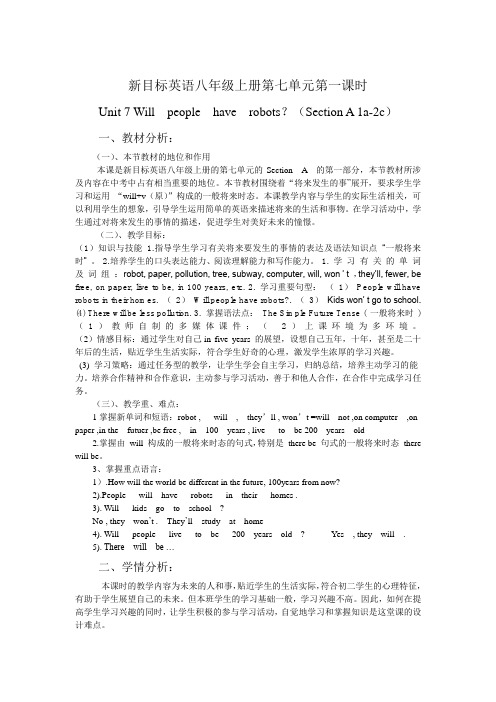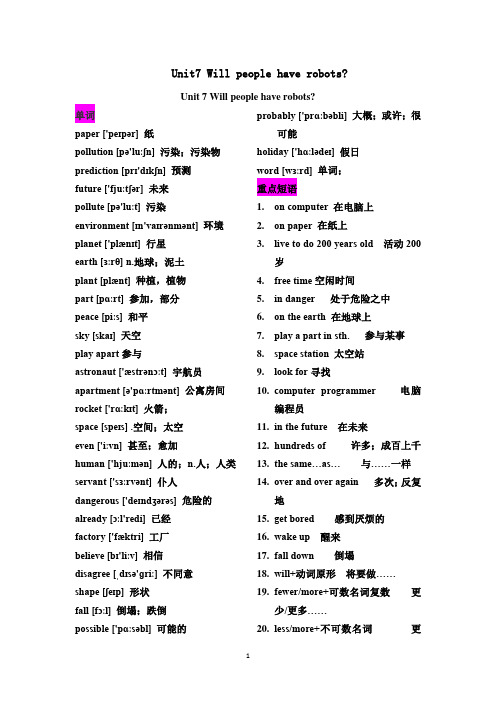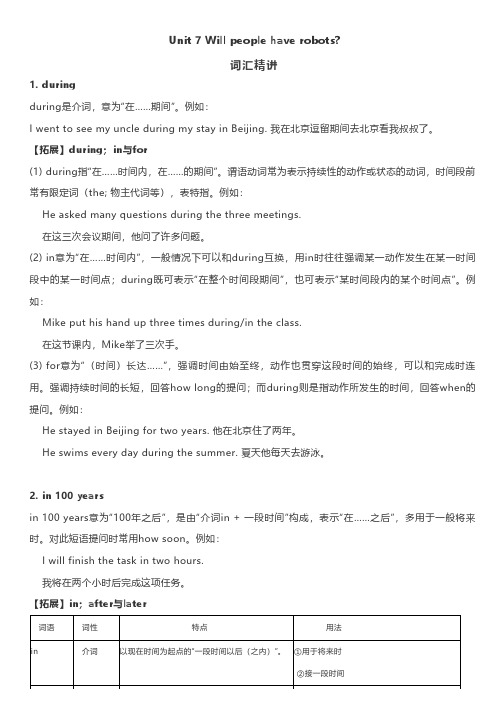2015-2016学年八年级英语上册 Unit 7 Will people have robots Section A(Grammar Focus-3c)课件
八年级英语上册Unit7Willpeoplehaverobots全部重要知识点(带答案)

八年级英语上册Unit7Willpeoplehaverobots全部重要知识点单选题1、There ______ an English show this weekend. Shall we go and watch it?A.are going to beB.wasC.will beD.were答案:C句意:这个周末将有一场英语表演。
我们去看好吗?考查there be句型的一般将来时。
根据“There”及“this weekend”可知,此句要用there be句型的一般将来时there is/are going to be或there will be的结构,排除B和D选项。
an English show是单数,be要用is,排除A,故选C。
2、We have decided to sell five things ________ we no longer use.A.thatB.whereC.who答案:A句意“我们已经决定卖5个我们不再用的东西”。
本题考查定语从句。
A.关系代词,指人,在从句中作主语、宾语或表语;B.关系副词,表示地点,在从句中作状语;C.关系代词,指人,在从句中作主语和宾语。
本句话中,先行词为five things,指物,且在从句中作宾语,用that,故选A。
3、—Is Helen here?—No, she isn’t here, She ________ in half an hour.A.arrivesB.arrivedC.will arriveD.has arrived答案:C句意:——Helen在这里吗?——不,她不在,她半个小时后就到了。
考查动词时态。
根据“in half an hour”可知,时间为半个小时后,应用一般将来时;其构成为:will+动词原形。
故选C。
4、---It’s reported that Chinese ___________more than 40 minutes a day reading WeChat(微信).---It’s true. But I think WeChat is taking too much of our time.A.spendB.costC.payD.take答案:A试题分析:句意:——据报道中国人一天花费四十多分钟读微信。
人教版英语八年级上册全册教材全解:人教版英语八年级上册 Unit 7 Will people hav

人教版英语八年级上册Unit 7 Will people have robots?教材全解【教材内容解析】Section A1.Do you think there will be robots in people’s homes? (P. 49)本句是主从复合句,从句为宾语从句,如果do you think放在句中,则为插入语,放在特殊疑问词后面,结构为:疑问词+do you think+主语+谓语+其它。
Which do you think is the best movie theatre?2.People will l ive to be 200 years old. (P. 49)live to be+基数词+years old意为“活到……岁”。
In the story, people will live to be 500 years old.3.Will people use money in 100 years? (P. 49)“in+一段时间”表示“在……之后”或“在……之内”,通常用于一般将来时,常用来回答how soon的提问;“for+一段时间”则表示持续多长时间,用来回答how long的提问。
The film will begin in two minutes.They have lived here for three years.4.What’s your prediction about the future?(P. 50)future作名词,表示“将来、未来”,in the future表示“在将来”。
Who knows what will happen in the future.5.I don’t think so.(P. 50)I don’t think so表示“我不这么认为”,肯定形式为I think so。
---Look at the cloud. It is going to rain.---I don’t think so. It will be sunny soon.【拓展】类似的结构还有:I hope so“我希望如此”,I hope not“我希望不是这样”,I’m afraid so“恐怕如此”,I’m afraid not“恐怕不是这样的”。
《Unit-7Will-people-have-robots》的教学设计及其评价

新目标英语八年级上册第七单元第一课时Unit 7 Will people have robots?(Section A 1a-2c)一、教材分析:(一)、本节教材的地位和作用本课是新目标英语八年级上册的第七单元的Section A 的第一部分,本节教材所涉及内容在中考中占有相当重要的地位。
本节教材围绕着“将来发生的事”展开,要求学生学习和运用“will+v(原)”构成的一般将来时态。
本课教学内容与学生的实际生活相关,可以利用学生的想象,引导学生运用简单的英语来描述将来的生活和事物。
在学习活动中,学生通过对将来发生的事情的描述,促进学生对美好未来的憧憬。
(二)、教学目标:(1)知识与技能 1.指导学生学习有关将来要发生的事情的表达及语法知识点“一般将来时” 。
2.培养学生的口头表达能力、阅读理解能力和写作能力。
1. 学习有关的单词及词组:robot, paper, pollution, tree, subway, computer, will, won ’ t ,they’ll, fewer, be free, on paper, live to be, in 100 years, etc. 2. 学习重要句型:(1)People will have robots in their homes. (2)Will people have robots?. (3)Kids won’ t go to school.(4) There will be less pollution. 3. 掌握语法点:The Simple Future Tense ( 一般将来时) (1)教师自制的多媒体课件;(2)上课环境为多环境。
(2)情感目标:通过学生对自己in five years 的展望,设想自己五年,十年,甚至是二十年后的生活,贴近学生生活实际,符合学生好奇的心理,激发学生浓厚的学习兴趣。
(3) 学习策略:通过任务型的教学,让学生学会自主学习,归纳总结,培养主动学习的能力。
(完整版)八年级上册英语第七单元

Unit7 Will people have robots? Unit 7 Will people have robots?单词paper ['peɪpər] 纸pollution [pə'luːʃn] 污染;污染物prediction [prɪ'dɪkʃn] 预测future ['fjuːtʃər] 未来pollute [pə'luːt] 污染environment [ɪn'vaɪrənmənt] 环境planet ['plænɪt] 行星earth [ɜːrθ] n.地球;泥土plant [plænt] 种植,植物part [pɑːrt] 参加,部分peace [piːs] 和平sky [skaɪ] 天空play apart参与astronaut ['æstrənɔːt] 宇航员apartment [ə'pɑːrtmənt] 公寓房间rocket ['rɑːkɪt] 火箭;space [speɪs] .空间;太空even ['iːvn] 甚至;愈加human ['hjuːmən] 人的;n.人;人类servant ['sɜːrvənt] 仆人dangerous ['deɪndʒərəs] 危险的already [ɔːl'redi] 已经factory ['fæktri] 工厂believe [bɪ'liːv] 相信disagree [ˌdɪsə'ɡriː] 不同意shape [ʃeɪp] 形状fall [fɔːl] 倒塌;跌倒possible ['pɑːsəbl] 可能的probably ['prɑːbəbli] 大概;或许;很可能holiday ['hɑːlədeɪ] 假日word [wɜːrd] 单词;重点短语1.on computer 在电脑上2.on paper 在纸上3.live to do 200 years old 活动200岁4.free time空闲时间5.in danger 处于危险之中6.on the earth 在地球上7.play a part in sth. 参与某事8.space station 太空站9.look for寻找puter programmer 电脑编程员11.in the future 在未来12.hundreds of 许多;成百上千13.the same…as… 与……一样14.over and over again 多次;反复地15.get bored 感到厌烦的16.wake up 醒来17.fall down 倒塌18.will+动词原形将要做……19.fewer/more+可数名词复数更少/更多……20.less/more+不可数名词更少/更多……21.have to do sth.不得不做某事22.agree with sb. 同意某人的意见23.such+名词(词组)如此……24.play a part in doing sth. 参与做某事25.There will be + 主语+其他将会有……26.There is/are +sb./sth.+doing sth.有……正在做某事27.make sb. do sth. help sb.with sth. 帮助某人做某事28.try to do sth. 尽力做某事29.It’s+ adj.+for sb. to do sth. 对某人来说,做某事……的。
八年级英语上册 Unit 7 Will people have robots(1a-2c)教材分析

Unit 7 Will people have robots(1a-2c)一、教材分析:1.教材内容:本单元的标题为本单元是Go for it (八年级上册) Unit 7 Will people have robots?第一课时Section A(1a-2C),主要围绕“Talk about the future life谈论未来的生活”这一主题展开各种教学活动,并以这一主题引出一般将来时的肯定句,一般疑问句,否定句以及特殊疑问句等语言功能。
本课时安排了许多贴近学生生活的活动,如谈论自己10年后的生活,假想100年后人们的生活,和人们生活环境的变化,通过这些活动,学生加强对目标语言的理解,着重培养学生的口语交际的能力,在进行了大量的语言输入之后,通过多次的听力练习,着重培养学生听录音,做出相应的听力活动。
活动和练习的形式灵活多样,既有客观性的口语训练,又有开放性的练习形式,从多角度对学生的语言技能进行训练;同时,进行相应的写作练习。
本单元旨在创造一个轻松、愉快的学习、交流环境,通过听、说、读、写来培养学生综合运用这些知识的能力。
并让学生能在“做中学”(learning by doing),通过有限的课堂实践活动,拓展以往的经历,能准确地用英语来表达。
2. 教材的地位及作用:本单元围绕谈论未来的生活,学习使用一般将来时时态。
通过让学生们对自己理想生活(dream life)的描述,反复运用句型what will be in ten years? I’ll be/work…. 来激发他们使用本单元所学单词的兴趣。
教材中提供的所有活动都以一般将来时时态为中心,通过一系列的听、说、读、写的训练,来加深对一般将来时时态的理解,明白英汉两种在结构及表达方法的一些异同点;本课时素材的中心话题是:10年或100年后,人们的生活会怎么样(工作,居住的地方,生活质量,环境污染)。
通过学生的阅读及写作,从而近一步提高学生学习英语的兴趣;同时,提高学生运用所学语言的综合能力。
人教版英语八年级上册Unit7《Will people have robots_》知识点

Unit 7 Will people have robots?词汇精讲1. duringduring是介词,意为“在……期间”。
例如:I went to see my uncle during my stay in Beijing. 我在北京逗留期间去北京看我叔叔了。
【拓展】during;in与for(1) during指“在……时间内,在……的期间”。
谓语动词常为表示持续性的动作或状态的动词,时间段前常有限定词(the; 物主代词等),表特指。
例如:He asked many questions during the three meetings.在这三次会议期间,他问了许多问题。
(2) in意为“在……时间内”,一般情况下可以和during互换,用in时往往强调某一动作发生在某一时间段中的某一时间点;during既可表示“在整个时间段期间”,也可表示“某时间段内的某个时间点”。
例如:Mike put his hand up three times during/in the class.在这节课内,Mike举了三次手。
(3) for意为“(时间)长达……”,强调时间由始至终,动作也贯穿这段时间的始终,可以和完成时连用。
强调持续时间的长短,回答how long的提问;而during则是指动作所发生的时间,回答when的提问。
例如:He stayed in Beijing for two years. 他在北京住了两年。
He swims every day during the summer. 夏天他每天去游泳。
2. in 100 yearsin 100 years意为“100年之后”,是由“介词in + 一段时间”构成,表示“在……之后”,多用于一般将来时。
对此短语提问时常用how soon。
例如:I will finish the task in two hours.我将在两个小时后完成这项任务。
英语八年级上册Unit7Willpeoplehaverobots[A-2]
(2016福建泉州) — Have you watched the movie Kung Fu Panda 3, Kelly?
— Not yet. I __A____ it with my classmates tonight.
A. will watch
B. was watching
C. have watched
(2016山东临沂) — Did you call Jenny?
— Oh no, I forget. I ___D___ her right
away.
A. called
B. have called
C. call
D. will call
(2015重庆B卷) Please wait. She __D___ to you in a few minutes.
我们明天去看他。
We will go to see him tomorrow. (2) 表示将来经常或反复发生的动作。
从现在起我将每天来。
From now on I will come every day.
2、基本句型:
肯定句: 主语 + will + v. 原形 否定句: 主语 + will + not + v. 原形
There will be more people and cars. Cities will be crowded and polluted.
The environment in earth will be in great danger.
People will have to move to other planets.
八年级英语上册 Unit 7 Will people have robots?(第2课时)说课稿
八年级英语上册 Unit 7 Will people have robots?(第2课时)说课稿一. 教材分析《八年级英语上册》Unit 7 “Will people have robots?” 是人教版新目标英语教材的一个单元。
本单元主要围绕未来科技的发展,特别是机器人在日常生活中的应用进行讲解。
通过本单元的学习,学生可以掌握一般将来时的被动语态,提高自己的听说读写能力,并激发他们对未来科技的想象和思考。
二. 学情分析八年级的学生已经掌握了英语学习的基本语法和词汇,具备一定的听说读写能力。
他们对新科技充满好奇,善于接受新鲜事物,但同时也可能对一些抽象的概念和语言表达感到困惑。
因此,在教学过程中,我们需要关注学生的个体差异,因材施教,激发他们的学习兴趣和积极性。
三. 说教学目标根据《义务教育英语课程标准》和教材内容,本节课的教学目标如下:1.知识目标:学生能够掌握一般将来时的被动语态,理解与未来科技相关的词汇和表达。
2.能力目标:学生能够在真实情境中运用所学知识进行交流,提高听说读写能力。
3.情感目标:激发学生对未来的想象和思考,培养他们对科技发展的积极态度。
四. 说教学重难点1.教学重点:学生能够熟练运用一般将来时的被动语态进行表达。
2.教学难点:学生能够准确理解与未来科技相关的词汇和表达,以及在真实情境中运用所学知识进行交流。
五. 说教学方法与手段本节课采用任务型教学法,结合情境教学法和分组合作学习法,利用多媒体教学手段,激发学生的学习兴趣,提高他们的参与度和积极性。
六. 说教学过程1.导入:通过展示一段关于未来科技的短片,引发学生对未来的想象,激发他们的学习兴趣。
2.呈现:教师通过PPT展示本节课的主要内容,引导学生关注一般将来时的被动语态和与未来科技相关的词汇。
3.操练:学生分组进行角色扮演,运用所学知识进行对话,教师给予指导和反馈。
4.巩固:学生完成一组有关未来科技的练习题,检测他们对知识的掌握程度。
人教版八年级英语上册Unit7Willpeoplehaverobots单元整体教学设计
5.研究性学习:分组进行项目研究,选择一个未来科技领域(如虚拟现实、人工智能等)进行深入了解,制作一份PPT,并在下节课进行分享。
6.家庭作业:鼓励学生与家长一起讨论未来机器人的发展,记录下家庭成员的观点和想法,以日记形式进行记录。
2.学生对与机器人相关的词汇较为陌生,但他们对未来科技充满好奇,有利于激发学习兴趣和积极性。
3.学生的阅读理解能力有待提高,特别是在把握文章主旨和细节信息方面。本章节的教学将通过阅读练习,帮助学生提高阅读技巧。
4.学生在表达个人观点方面存在一定的困难,需要教师引导和鼓励,培养他们的思辨能力和口语表达能力。
2.学生讨论:学生分组讨论,分享他们对未来生活的期待和想象。教师巡回指导,鼓励学生用英语表达自己的观点。
3.导入语:After discussing the future life, let's learn about the topic of Unit 7: Will people have robots? In this unit, we will talk about the development of robots and the possible changes they will bring to our lives.(讨论完未来生活后,我们来学习第七单元的主题:人们会有机器人吗?在本单元,我们将讨论机器人的发展以及它们可能给我们的生活带来的变化。)
2.任务型教学法:设计各种任务,如小组讨论、角色扮演等,让学生在实际语境中运用所学知识,提高英语交际能力。
3.自主学习与合作学习:鼓励学生课前预习,课上积极参与讨论,与同学分享学习心得,培养学生的自主学习能力和团队协作精神。
[学海风暴]2015-2016学年英语人教版八年级上Unit7WillpeoplehaverobotsSectionB1a-1e
an apartment 公寓
I live in an apartment across the street from here.
1 Write each word in the correct a column below.
astronaut house apartment computer programmer
4. She dances better than Mary _______.
A. is
B. has C. does D. dance
5. Mary usually _______ up at five o’clock.
A. will get B. got
C. get D. gets
6. They ______ four English classes a week last term.
Jobs
Transportation Places to
live
astronaut computer programmer
robot cleaner super policeman
train rocket
space ship helicopter (直升机)
house apartment space station
亮) at night. 5.He hopes to travel into space by rocket (火箭).
Homework
1. Read the conversations in 1e more times. 2. Write a report according to your
conversations.
A. has B. have C. had D. are having
- 1、下载文档前请自行甄别文档内容的完整性,平台不提供额外的编辑、内容补充、找答案等附加服务。
- 2、"仅部分预览"的文档,不可在线预览部分如存在完整性等问题,可反馈申请退款(可完整预览的文档不适用该条件!)。
- 3、如文档侵犯您的权益,请联系客服反馈,我们会尽快为您处理(人工客服工作时间:9:00-18:30)。
There will be more people. People will live under the sea. There will be less water. Robots will do most of the heavy work. People will have more free time.
Discuss with your partners in your group and talk about what a city in the future will be like.
There will be more trees and flowers. The air will be cleaner. The sky will be bluer.
二、用所给词的适当形式填空。 1.---What _______ do (do) this Sunday? will you ______ ---There _____ will _____ be (be) a football match. ______ Will go (go) with us? you _______ will ______ go (go) to see your father as soon as I 2. I _____ get to Beijing. 3. I think it ______ will _____ be (be) rainy tomorrow. will ______ send (send) me a new bike when 4. My father _____ I am tall enough.
I wish that there would be peace and harmony in
(2) I hope so意为“我希望如此”,so用作副词,
意为“这样,如此”。常与动词连用,以避免重复。
常与so连用的动词有say, think, speak, believe, do等。
I don't think so. 我认为不是这样。
I'm =I am you’re = you are
there's = there is there’re = there are
don’t = do not doesn’t = does not
Language points
1.— Will people use money in 100 years?人们在 100年以后还用钱(消费)吗? — No, they won't. Everything will be free.不,人 们将不会使用钱。所有的东西都将是免费的。 (1)这是个以 will 开头的一般将来时态的一般疑 问句,形式为:Will + 一般陈述句? (2)in + 一段时间表示“在(将来的)一段时间 以后”,常用于将来时态。 --- How soon will you come back? 你多久后回来? --- I will come back in a week. 我将在一周后回来。
一、用fewer或less 填空。
1. I earn _____ less money than my sister.
2. There are ______cars parked outside than fewer
yesterday. fewer 3. We have ______students this year than last year. fewer 4. You ought to smoke _____cigarettes and drink less _____beer.
(3)everything 是不定代词,意思是“每件事”, every 和 every 组合的一些不定代词,常用个体概念表 达整体含义。
Everything goes well. 一切都好。
(4)be free 这里指免费的,还可以表示“空闲的,
有时间的”,相当于have time。
Are you free this evening?= Do you have time this evening?你今晚有空吗?
Homework
1. 完成课时作业。 2. 熟记Section A 部分的已学的词汇 及句型。
Will there be world peace? Kids will study at home on computers. Yes, I hope so. They won’t go to school.
There be 的一般将来时,more+可 数/不可数名词;fewer+可数名词; less+不可数名词
―live to be + 基数词 + years 意为“活到 · · · · · 岁”, 1. Kids study old‖ at school now. · In 100 years,_________ fewer kids years old 可省略。
study at school, they will study on computers at home. __________________________________________ 2. I sometimes see blue skies in my city, but in the future_____________________________________ there will be fewer blue skies, but more pollution. 3. People now usually live to be about 70–80 years old, but in the future________________________ people will live to be 200 years old. 4. Families usually spend time together on weekends, but maybe in 200 years____________________ we will be lonely and we will only see each other on telephones or on computers. ________________________________________
Countable nouns There will be more people. There will be fewer trees.
Uncountable nouns There will be more pollution. There will be less free time.
’ll = will won’t = will not
Language points
In the future, there will be less fresh water because there will be more pollution in the sea.在未来,新鲜的 水将会更少,因为在海洋中污染将会更多。 (1) in the future意为“将来,未来”。 The boy wants to become a philosopher in the future.这个男孩想在将来成为一名哲学家。 (2)in the future 和in future 辨析: in the future意为“将来,未来。 We learn from the past, experience the present and hope for success in the future.我们从过去中学习,体 验现在,展望未来的成功。
less 1. In the future, there will be ________ fresh water because there will be _________ pollution in the sea. more 2. In 100 years, there will be ________ more cars because there will be _________ more people in the cities. 3. There will be _______ fewer jobs for people because more robots will do the same jobs as people. _______ more cities because people 4. I think there will be _______ more buildings in the country. will build ________ 5. In 50 years, people will have _______ more free time because there will be ________ things to do. less
in future意为“以后,今后”(=from now on),
也可意为“不久的将来”(=in the near future或
soon)。
My dream will come true in future/soon.我的梦想 不久就会实现。
3 b
Complete the predictions with what you think will happen.
Grammar Focus
What will the future be like?
Cities will be more polluted. And there will be fewer trees.
Will people use money in No, they won’t. 100 years? Everything will be free.
